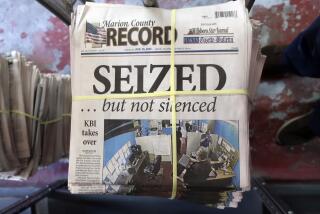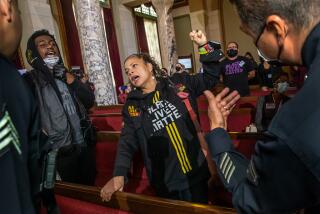Editorial: In San Francisco, police target a journalist — and flout the law
- Share via
It isn’t just journalists who should be outraged over what happened to freelance videographer Bryan Carmody in San Francisco last Friday: Police handcuffed him while they searched his home in an apparent bid to identify a confidential source. The officers seized telephones, computers, tablets and notebooks after using a sledgehammer to try to break through Carmody’s front gate.
In a separate search of the office of his news service, police found at least one of the things they had been looking for: a police report about the death in February of the city’s public defender, Jeff Adachi.
The searches of Carmody’s house and office were authorized by warrants obtained from judges as part of a criminal investigation into the leaking of the report, which contained details about Adachi’s death. The medical examiner found in March that Adachi died as the result of an accidental overdose of cocaine and alcohol.
Enter the Fray: First takes on the news of the minute »
But the fact that police obtained warrants doesn’t means the searches were legal. As David Snyder, a lawyer and executive director of the First Amendment Coalition, pointed out, California expressly prohibits police from seizing material covered by California’s shield law. The shield law, part of the state Constitution, says that journalists can’t be punished in court for refusing to identify their sources or turn over confidential information related to newsgathering. California and the dozens of other states that have shield laws recognize that sometimes it’s necessary for journalists to protect the identities of their sources in order to report about corruption or government misconduct.
There is no federal shield law, but these searches also seem to violate a federal statute known as the Privacy Protection Act of 1980. That law requires law enforcement officers, including state and local police, to seek “work product materials” from a journalist through a subpoena rather than by executing a search warrant. That way a journalist can challenge the subpoena. (There is an exception for cases in which a journalist is reasonably suspected of committing a crime. But Carmody’s lawyer said police haven’t told him or his client that Carmody is suspected of a crime.)
The Freedom of Information Committee of the Society of Professional Journalists of Northern California warned that “San Francisco’s wrongful actions against Carmody threaten fundamental journalistic freedoms which are vital to a functioning democracy.”
That statement places laws such as the shield law and the Privacy Protection Act in proper perspective: They are intended not to confer special privileges on one profession but to serve the public interest. The public as well as the press should be shocked by what happened to Bryan Carmody.
Follow the Opinion section on Twitter @latimesopinionand Facebook
More to Read
A cure for the common opinion
Get thought-provoking perspectives with our weekly newsletter.
You may occasionally receive promotional content from the Los Angeles Times.










